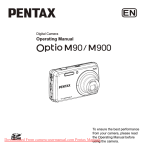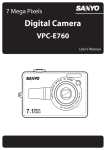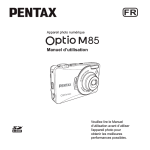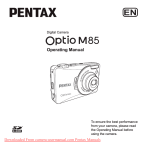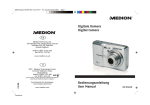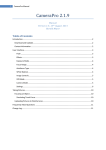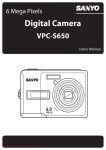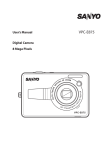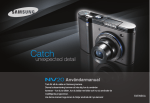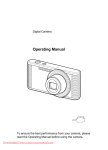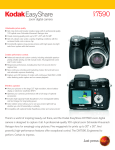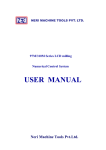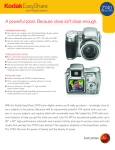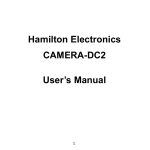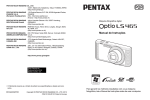Download Pentax Optio M90 User`s Manual
Transcript
EN Digital Camera Operating Manual Downloaded from ManualsCamera.com To ensure the best performance from your camera, please read the Operating Manual before Manuals using the camera. Downloaded from ManualsCamera.com Manuals Table of Contents Preface ....................................................................................... i Regarding Copyrights .............................................................................................. i Trademark Recognition ........................................................................................... i To users of this camera .......................................................................................... ii Regarding Product Registration ............................................................................. ii USING YOUR CAMERA SAFELY ................................................................................ ii About the Camera .................................................................................................. ii Warning ................................................................................................................ ii Caution ................................................................................................................ iii About the Battery charger ..................................................................................... iv Caution ................................................................................................................ iv Care to be Taken During Handling .......................................................................... iv Introduction .............................................................................. 1 System Requirements ........................................................................1 Package Contents ...............................................................................1 Main Features .....................................................................................1 Camera Views .....................................................................................2 LED Indicators ....................................................................................3 Camera Buttons ..................................................................................3 Navigation Buttons ................................................................................................. 3 The SCENE Button ................................................................................................. 6 Function Buttons .................................................................................................... 7 LCD screen ............................................................................................................ 7 Capture/Video Mode Display ................................................................................... 8 Camera Setup .......................................................................... 10 Attaching the Wrist Strap .................................................................10 Inserting the Battery ........................................................................10 Inserting an SD/SDHC Memory Card ...............................................11 Downloaded from ManualsCamera.com Manuals English About this Manual ...............................................................................i Charging the Battery ........................................................................12 Turning On ........................................................................................12 First Time Use ...................................................................................13 Getting Started ........................................................................ 14 English Taking Photos ...................................................................................14 Anti-Shake Function ............................................................................................. 14 Using Macro Mode ............................................................................................... 14 Setting the Flash Mode ......................................................................................... 15 Using the Zoom in/out Function ............................................................................ 15 Using the Self-timer and Burst Photography ........................................................... 15 Using the AEB (Auto Exposure Bracketing) Function ............................................... 16 Face detection AF/AE Function .............................................................................. 17 Face Beautification Function ................................................................................. 17 Setting the SCENE Mode ....................................................................................... 18 Using Auto scene Mode ........................................................................................ 19 Using the Smile Catch Mode ................................................................................. 19 Using the Self Portrait Mode ................................................................................. 19 Using Frame Composite Mode ..........................................................20 Taking Auto Panoramic Pictures ......................................................20 Recording Videos ..............................................................................22 Recording Audio Files .......................................................................22 Recording Voice Memos ...................................................................23 Capture Settings ...................................................................... 24 The Capture Menu ............................................................................24 Image Resolution ................................................................................................. 25 Image Quality ...................................................................................................... 25 Focus Zone .......................................................................................................... 25 EV Compensation ................................................................................................. 26 AEB .................................................................................................................... 26 White Balance ...................................................................................................... 26 Downloaded from ManualsCamera.com Manuals Video Capture Menu .........................................................................29 Video Resolution .................................................................................................. 29 White Balance ...................................................................................................... 29 Color ................................................................................................................... 29 Photo, Video & Audio Playback ............................................... 30 Playback Mode Display .....................................................................30 Viewing Photos/Videos on the LCD Screen ......................................31 Viewing M-Burst Photos ........................................................................................ 31 Listening to Audio Files ......................................................................................... 31 Listening to Voice Memo ....................................................................................... 32 Viewing Photos/Videos on your TV ..................................................32 Zooming In/Out During Playback ....................................................32 Deleting Images/Videos/Audios ......................................................33 Using the Playback Menu .................................................................33 DPOF .................................................................................................................. 34 Slideshow ............................................................................................................ 35 Resize ................................................................................................................. 35 Rotate ................................................................................................................. 36 Protect ................................................................................................................ 36 D-Lighting ........................................................................................................... 37 Red-Eye Removal ................................................................................................. 37 Fish Eye .............................................................................................................. 38 Frame Composite ................................................................................................. 38 Move ................................................................................................................... 40 Divide ................................................................................................................. 40 Transferring Photos/Videos to your PC ............................................41 Downloaded from ManualsCamera.com Manuals English ISO Speed ........................................................................................................... 27 AE Metering ......................................................................................................... 27 Color ................................................................................................................... 27 Sharpness ........................................................................................................... 28 Contrast .............................................................................................................. 28 Camera Settings ...................................................................... 42 The Setup Menu ................................................................................42 English LCD Brightness .................................................................................................... 42 File Number ......................................................................................................... 42 Digital Zoom ........................................................................................................ 43 Quick View .......................................................................................................... 43 Camera Sound ..................................................................................................... 43 Power Saving ....................................................................................................... 44 Auto Power Off .................................................................................................... 44 Video Out ............................................................................................................ 44 Date Stamp ......................................................................................................... 45 Date and Time ..................................................................................................... 45 Language ............................................................................................................ 45 Image Storage ..................................................................................................... 46 Format ................................................................................................................ 46 Reset .................................................................................................................. 47 Voice Memo ......................................................................................................... 47 About .................................................................................................................. 47 Specifications .......................................................................... 48 Troubleshooting ...................................................................... 51 Downloaded from ManualsCamera.com Manuals Preface i Preface Thank you for purchasing this PENTAX Digital Camera. Please read this manual before using the camera in order to get the most out of all the features and functions. Keep this manual safe, as it can be a valuable tool in helping you to understand all the camera capabilities. Regarding Copyrights Images taken using the PENTAX Digital Camera that are for anything other than personal enjoyment cannot be used without permission according to the rights as specified in the Copyright Act. Please take care, as there are cases where limitations are placed on taking pictures even for personal enjoyment during demonstrations, performances or of items on display. Images taken with the purpose of obtaining copyrights also cannot be used outside the scope of use of the copyright as laid out in the Copyright Act, and care should be taken here also. Trademark Recognition • PENTAX and Optio are trademarks of HOYA CORPORATION. • • SDHC logo ( ) is a trademark of SD-3C, LLC. Microsoft and Windows are registered trademarks of Microsoft Corporation in the United States and other countries. Windows Vista is either a registered trademark or trademark of Microsoft Corporation in the United States and/or other countries. Adobe, the Adobe logo, and Reader are either registered trademarks or trademarks of Adobe Systems Incorporated in the United States and/or other countries. ArcSoft®, and its logo are either the registered trademark or trademark of ArcSoft Inc. in the United States and/or other countries. All other brands or product names are trademarks or registered trademarks of their respective companies. • • • • Downloaded from ManualsCamera.com Manuals About this Manual English About this Manual ii Preface To users of this camera • • English • • • There is a possibility that recorded data may be erased or that the camera may not function correctly when used in surroundings such as installations generating strong electromagnetic radiation or magnetic fields. The liquid crystal panel used in the display is manufactured using extremely high precision technology. Although the level of functioning pixels is 99.99% or better, you should be aware that 0.01% or fewer of the pixels may not illuminate or may illuminate when they should not. However, this has no effect on the recorded image. There is a possibility that the illustrations and the display screen in this manual are different from the actual product. Do not use or store this device in the vicinity of equipment that generates strong electromagnetic radiation or magnetic fields. Strong static charges or the magnetic fields produced by equipment such as radio transmitters could interfere with the monitor, damage the stored data, or affect the product's internal circuitry and cause camera misoperation. Regarding Product Registration In order to better serve you, we request that you complete the product registration on the PENTAX website. Thank you for your cooperation. USING YOUR CAMERA SAFELY We have paid close attention to the safety of this product. When using this product, we request your special attention regarding items marked with the following symbols. Warning This symbol indicates that violating this item could cause serious personal injuries. Caution This symbol indicates that violating this item could cause minor or medium personal injuries, or material losses. About the Camera Warning • Do not attempt to take the camera apart or remodel the camera. High voltages are present within the camera, and there is therefore a danger of electric shocks if the camera is taken apart. About this Manual Downloaded from ManualsCamera.com Manuals • • • • • If the inside of the camera should become exposed as a result of, for example, the camera being dropped, please do not under any circumstances touch such exposed portions, as there is a danger of receiving an electric shock. To avoid the risk of it being swallowed by mistake, keep the memory card out of the reach of small children. Seek medical attention immediately if a card is accidentally swallowed. Wrapping the strap of the camera around your neck is also dangerous. Please take care that small children do not hang the strap around their necks. If the camera emits smoke or a strange smell, or in the event of any other irregularity, stop using the camera immediately, remove the battery and contact your nearest PENTAX Service Center. Continued use of the camera may result in fire or electric shock. During thunderstorms, unplug and discontinue use of the Battery charger. Continued use could cause equipment failure, a fire, or electric shock. Caution • • • • • • • • • • Never try to disassemble or short the battery. Also, do not dispose of the battery in a fire, as they may explode. Do not charge any battery other than rechargeable lithium-ion battery D-LI108. The battery could explode or catch fire. Do not place your finger on the flash when it is discharging as there is a risk of burns. Do not discharge the flash while it is touching your clothing as there is a risk of discoloring of the clothing. If any leakage from the battery should come in contact with your eyes, do not rub them. Flush your eyes with clean water and get medical attention immediately. If any leakage from the battery should come in contact with skin or clothes, wash the affected areas thoroughly with water. Precautions for D-LI108 Battery Usage: - BATTERY MAY EXPLODE OR FIRE IF MISTREATED. - DO NOT DISASSEMBLE OR DISPOSE OF IN FIRE. - DO NOT CHARGE EXCEPT SPECIFIED CHARGING CONDITION. - DO NOT HEAT ABOVE 140 °F/60 °C, OR SHORT CIRCUIT. - DO NOT CRUSH OR MODIFY. Remove the battery from the camera immediately if it becomes hot or begins to smoke. Be careful not to burn yourself during removal. Some portions of the camera heat up during use, so please take care, as there is a risk of low temperature burns if such portions are held for long periods of time. Should the liquid crystal display be damaged, be careful of glass fragments. Also, be careful not to allow the liquid crystal to get on your skin or in your eyes or in your mouth. Downloaded from ManualsCamera.com Manuals About this Manual English Preface iii iv Preface • Depending on your inherent factors or physical condition, the use of the camera may cause itching, rashes or blisters. In case of any abnormality, stop using the camera and get medical attention immediately. About the Battery charger English Caution • • • • Do not place heavy objects on the Battery charger, allow heavy objects to drop onto it or allow the Battery charger to become damaged due to excessive bending. If the Battery charger becomes damaged, consult a PENTAX Service Center. Do not short or touch the output terminals of the product while it is still plugged in. Do not plug in the Battery charger with wet hands. This can cause an electrical shock. Do not subject the product to strong impacts or allow it to drop onto a hard surface. This can cause a malfunction. Care to be Taken During Handling • • • • • • • • • Take the Worldwide Service Network listing that is included in the package with you when traveling. This will be useful if you experience problems abroad. When the camera has not been used for a long time, confirm that it is still working properly, particularly prior to taking important pictures (such as at a wedding or during traveling). Contents of the recording cannot be guaranteed if recording, playback or transferring your data to a computer, etc. is not possible due to a malfunction of your camera or recording media (memory card), etc. The lens on this camera is not interchangeable. The lens is not removable. Do not clean the product with organic solvents such as thinner, alcohol or benzene. Places of high temperature and humidity should be avoided. Particular care should be taken regarding vehicles, which can become very hot inside. Storing the camera where pesticides and chemicals are handled should be avoided. Remove from case and store in a well-ventilated place to prevent the camera from becoming moldy during storage. As this camera is not waterproof, do not use the camera where it may come in contact with rain, water or any other liquid. Ensure that the camera is not subjected to substantial vibrations, shocks or pressure as this may cause damage or malfunction. Place the camera on a cushion for protection when the camera is subjected to the vibrations of a motorbike, car, ship, etc. If the camera is subjected to substantial vibrations, shocks or pressure, take your camera to your nearest PENTAX Service Center and have it checked. The temperature range in which the camera can be used is 0°C to 40°C (32°F to 104°F). About this Manual Downloaded from ManualsCamera.com Manuals • • • • • • • • • The liquid crystal display will become black at a high temperature but will return to normal when normal temperatures are returned to. The response speed of the liquid crystal display becomes slow at low temperatures. This is due to the properties of the liquid crystal and is not a fault. Periodic checks are recommended every 1 to 2 years in order to maintain high performance. If the camera is subjected to rapid temperature changes, condensation may form on the inside and outside of the camera. Therefore put the camera in a bag or plastic bag, and take the camera out when the difference in temperature has subsided. Be careful not to allow dirt, mud, sand, dust, water, toxic gases or salt to enter the camera as this may damage the camera. Wipe away any raindrops or water droplets and allow the camera to dry. Please note that formatting a memory card or internal flash memory will delete all data; however it may still be possible to recover that data using off-the-shelf data recovery software. Please manage your camera memory at your own risk. Please do not press forcefully on the display. This could cause breakage or malfunction. Be careful not to sit down with the camera in your back pocket as this may damage the exterior of the camera or the display. When using a tripod with the camera, be careful not to over tighten the screw in the tripod socket on the camera. Downloaded from ManualsCamera.com Manuals About this Manual English Preface v 1 Introduction Introduction Congratulations on the purchase of your new digital camera. This manual provides step-by-step instructions on how to use your camera, and is intended for your reference only. English System Requirements In order to get the most out of your camera, your computer must meet the following system requirements: • OS: Windows XP/Vista/7 • Memory: 512 MB or above • HDD space: 500 MB or above • USB port Package Contents Check the contents of your camera package. It should contain: • Camera Optio M90/M900 • USB/AV 3-in-1 cable • Wrist strap • Rechargeable Li-ion battery • Charger • Quick start guide • Application Software and Operating Manual (CD-ROM) Main Features • • • • • • • 12.1 mega pixels resolution 25X zoom (Up to 5X optical zoom and 5X digital zoom) 1/2.3 inch CCD image sensor 2.7 inch TFT LCD monitor 20 MB internal flash memory, support SD/SDHC memory card up to 32 GB Sleek and slim design Easy-to-use button interface System Requirements Downloaded from ManualsCamera.com Manuals Introduction 2 Camera Views 2 4 3 5 6 9 8 10 11 12 13 English 1 7 14 Front View 1. Microphone 2. 3. 15 18 19 16 17 Rear View 8. LCD screen Shutter button 9. OK button Flash 10. 4-way navigation buttons 4. Self-timer LED 11. Playback button 5. Power button 12. Zoom button 6. Zoom Lens 13. SCENE button 7. Speaker 14. Tripod mount 15. Battery/SD card compartment 16. Delete/Face Beautification button 17. MENU button 18. Wrist strap loop 19. PC/AV port Downloaded from ManualsCamera.com Manuals Camera Views 3 Introduction LED Indicators LED English Self-timer LED LED Status Camera Status Off Self-timer off. Red (blinking) (10 sec) Timer count down, flash after 10 seconds. Red (blinking) (2 sec) Timer count down, flash after 2 seconds. Camera Buttons Navigation Buttons The 4-way navigation buttons and the OK button allow you to access the various options available from the On Screen Display (OSD) menu. You can configure a wide range of settings to ensure maximum results from your photos and videos. Icon Button Function 1. 2. OK OK/Anti-shake 3. LED Indicators Confirm a selection when using the OSD menus. In Capture mode: • Press to enable/disable the Anti-Shake in Auto mode. • Enable AF area selection when SELECTED AREA is selected in FOCUS ZONE. In Playback mode: • Press to start and pause the video playback. • Press to play and pause the audio playback. • Press to stop the voice memo playback. Downloaded from ManualsCamera.com Manuals 1. 2. Up/Flash 3. 1. 2. Right/ Self-timer/ Burst mode 3. 4. 1. 2. 3. Down/Screen 4. Move up in the OSD menus. In Capture mode: • Scroll through the flash mode options (Auto, Off, Fill and Red-eye Reduction). • Press to pan up in AF area selection. In Playback mode: • Press to pan up in zoom in mode. • Press to move up in the thumbnail display. Move right in the OSD menus. In Capture mode: • Press to scroll through the Self-timer/Burst/Multi-Burst mode. • Press to pan right in AF area selection. In Video mode: • Press to scroll through the Self-timer options. In Playback mode: • Press to pan right in zoom in mode. • Press to navigate to next image in single image display. • Press to move right in the thumbnail display. • Press to fast forward video playback during Pause mode. Move down in the OSD menus. In Capture mode: • Press to enable the following functions: full icon, full icon with histogram and simple display (hide all icons except the mode icon). Press again to turn all icons back on the LCD screen. In Video mode: • Press to turn off extra icons on the LCD screen, press again to turn all icons back on the LCD screen. In Playback mode: • Press to pan down in zoom in mode. • Press to move down in the thumbnail display. • Press to enable the following functions: normal, information, simple display. Press again to back normal display. Downloaded from ManualsCamera.com Manuals Camera Buttons English Introduction 4 5 Introduction 1. 2. 3. Left/Macro English 4. Move left in the OSD menus. Go up to the previous level in the OSD menus. In Capture mode: • Press to enable Macro mode. Macro icon displays on the LCD screen. In Playback mode: • Press to pan left in zoom in mode. • Press to navigate to previous image in single image display. • Press to move left in the thumbnail display. • Camera Buttons Press to fast rewind video playback during Pause Downloaded from ManualsCamera.com Manuals mode. Introduction 6 The SCENE Button Mode Type Icon Mode Type Auto Snow Auto Scene Sunset P-Mode (Program Mode) Fireworks Auto Panorama Beach Smile Catch Party Sport Foliage Landscape Kids & Pets Night Landscape Copy Portrait Backlight Self Portrait Frame Composite Night Portrait Audio Museum Video Downloaded from ManualsCamera.com Manuals Icon Camera Buttons English The camera is equipped with a convenient SCENE button that takes you to the SCENE menu where you can scroll between different modes and choose different scene options. Use the Left/Right/Up/ Down navigation buttons to scroll and use the OK button to select. Use the SCENE button to: 7 Introduction Function Buttons Button Function MENU Menu Press to display the Menu options. Playback Press to review photo/video/audio clips saved in the internal memory or on the memory card. Delete/ Face Beautification button In Capture mode: • Press to enable/disable the Face Beautification function. • Press to delete during mark appears on LCD (QUICK VIEW has to be set “ON” at SETUP mode). In Playback mode: • Press to delete image/s. Note: Face Beautification function is not available in auto panorama, sport, landscape, night landscape, fireworks, foliage, copy and video mode. Zoom in In Capture mode: • Press to zoom in on the subject to be taken. In Playback mode: • Press to zoom in on saved photos. Zoom out In Capture mode: • Press to zoom out from the subject to be taken. In Playback mode: • Press to zoom out of saved photos. • Press to view thumbnails of all current saved media. English Icon / T/ W/ LCD screen The 2.7’’ TFT LCD screen shows all important information regarding camera settings as well as the visual image for your photo or video. Use the SCENE button to switch between screen modes. Press the Down/Screen button to switch among a Full display with histogram and without histogram or a Simple display (only mode icon and focus area are shown while other icons are hidden). Camera Buttons Downloaded from ManualsCamera.com Manuals Introduction 8 Capture/Video Mode Display Auto Auto Scene Capture Mode Video 2. Image Resolution 1 12M 24 Auto Panorama 10.7M 3:2 23 Smile Catch 9M 16:9 22 Sport 8M Landscape 5M Night Landscape 3M Portrait 2M Self Portrait VGA 640X480 Snow 320X240 Auto Flash Beach Flash Off Party Fill Flash Kids & Pets Copy Backlight Frame Composite Audio 5 6 7 8 9 10 11 ISO 1600 12 13 20 19 18 17 1/125 F3.5 +1.0EV 15 14 16 Video Mode 1 2 4 7 8 00:00:00 9 23 3. Flash Fireworks Foliage 4 21 Video Mode Museum Sunset 3 9999 P-Mode Night Portrait 2 Capture Mode 12 21 Red-eye Reduction 4. Self-Timer/Burst Mode M-burst Mode Self Timer 10 Seconds 5. AEB 2 Seconds 6. Macro indicator Burst Mode Downloaded from ManualsCamera.com Manuals Macro Mode Camera Buttons English 1. Scene indicator 9 Introduction 7. Image Counter Capture Mode Quantity 9999 English 00:00:00 8. Memory Interface SD Card Fluorescent Selected Area Cloudy 24. AE Metering Best Matrix Better Center Weighted Good Spot 20. Sharpness Internal Memory 9. Battery Indicator High Battery Full Normal Battery Medium Low 21. Contrast Battery Low Battery Insufficient Tungsten Center 19. Image Quality Video Mode Time Multi-Zone Blinking 10. Anti-Shake High Normal 11. Camera Steady Warning Low 22. ISO Speed Auto 12. Zoom Bar ISO 80 ISO 100 ISO 200 13. AF Frame 14. EV Compensation -2.0 EV~ +2.0 EV 15. Aperture Value F3.5/F5.9 16. Shutter Speed 2~1/1000 ISO 400 ISO 800 ISO 1600 23. White Balance 17. Date Stamp Auto 18. Focus Zone Sunny Camera Buttons Downloaded from ManualsCamera.com Manuals Camera Setup 10 Camera Setup Follow these instructions to attach the wrist strap to your camera to facilitate easy carrying: 1. Insert the short loop of the strap in the strap eyelet. 2. String the larger loop of the strap through the short loop and pull tight to attach the strap to the camera. Inserting the Battery Follow these instructions to insert the Li-ion battery into the battery compartment. 1. Open the battery compartment at the bottom of the camera. 2. Insert the battery into the compartment observing the correct polarity. 3. Close the battery compartment. Note: The Li-ion battery should be fully charged more than 4 hours before using for the first time. Downloaded from ManualsCamera.com Manuals Attaching the Wrist Strap English Attaching the Wrist Strap 11 Camera Setup Inserting an SD/SDHC Memory Card English The camera features Approx. 20 MB internal flash memory but you may also use an optional SD/SDHC memory card for additional storage. Follow these instructions to insert the SD/SDHC card. 1. Open the battery compartment on the bottom of the camera. 2. Insert the SD/SDHC card into the memory card slot as shown. (Label side up) 3. Close the battery compartment. To remove the SD/SDHC card, gently push the card until it pops out. Pull out the card carefully. Note: • Format memory cards via CAMERA before first use, and be sure to reformat all memory cards after using them in a computer or other device. For more information on formatting memory cards, see page 46. • If remove or insert SD card when power on, the camera will tune off automatically. Inserting an SD/SDHC Memory Card Downloaded from ManualsCamera.com Manuals Camera Setup 12 Charging the Battery English Insert the battery into the Charger observing the correct polarity and plug in the Charger as shown. Note: This charger is designed for the specified batteries. Do not use the charger to charge any battery other than the specified ones. It may cause the battery leaking, heating, explosion or on fire. Turning On Press and hold the Power button to turn on the camera. To turn off the camera, press the Power button again. Downloaded from ManualsCamera.com Manuals Charging the Battery 13 Camera Setup First Time Use English Press the Power button as described on page 12, a welcome screen displays momentarily on the LCD screen. If the camera is turned on for the first time, the LANGUAGE menu LANGUAGE pops up automatically after powering on the camera. Select the desired language by Up/Down navigation buttons, then press the ENGLISH OK button to confirm. DEUTSCH FRANÇAIS ITALIANO ESPAÑOL After the desired language is selected, the DATE & TIME menu pops up. Select each field and adjust the value using the navigation buttons. Press the OK button to confirm. DATE & TIME (Year) 2010 / 05 / 01 12 : 00 Note: If the Date and Time is reset (when the batteries die or are removed and the camera is not used for a long period), the DATE & TIME setup screen displays automatically. First Time Use Downloaded from ManualsCamera.com Manuals Getting Started 14 Getting Started Taking Photos Taking a photo with the camera is very simple. Turn the camera on and press the SCENE button to access the Auto mode. 1. Frame the shot on the LCD screen and press the Shutter button halfway. The camera automatically adjusts the focus and exposure. The AF Frame turns green when ready. 2. Press fully and hold the Shutter button to capture the image. When a camera steady warning icon exposure time is required. appears, hold the camera as still as possible, as a longer Anti-Shake Function This function is available in Auto mode. Press the OK button to enable the Anti-Shake function, and press again to disable it. An Anti-Shake icon is activated. displays on the LCD screen when the function Using Macro Mode Macro mode is designed for close-up photography and can capture all detail even when your subject is very close to the camera. Press the Left/Macro the LCD screen. navigation button. The Macro icon Downloaded from ManualsCamera.com Manuals displays on Taking Photos English Now that you are familiar with the layout of your camera, you are ready to start taking photos and movies. 15 Getting Started Setting the Flash Mode You can choose from four flash modes to suit various lighting conditions. Press the Up/Flash navigation button to scroll through the four modes on the LCD screen. The flash setting remains the same for subsequent photos until you change it as described above. English Auto flash: The flash fires automatically when needed. Flash off: The flash is turned off. Fill flash: The flash always fires. Red-eye Reduction: The flash fires twice so as to reduce the red-eye effect. Using the Zoom in/out Function The camera comes equipped with 5X optical zoom and 5X digital zoom that allows you to zoom in on your subject. To use the zoom: 1. Press the right side of the Zoom button T to zoom in on your subject. 2. Press the left side of the Zoom button W to zoom out from your subject. Using the Self-timer and Burst Photography The camera comes equipped with a self-timer which allows you to take photos after a pre-defined delay. The burst photography feature allows you to take multiple consecutive photos by pressing and holding the Shutter button. The multi-burst photography feature allows you to take multiple (16) consecutive VGA photos by pressing the Shutter button once. To set the self-timer/burst mode: 1. 2. Press the Right/Self-timer /Burst mode navigation button to cycle through the self-timer ( or ) and burst photography options ( or ) on the LCD screen. Once you have selected an option, frame and take your shot. In self-timer mode, the icon will flash until the time expires and the photo is taken. Taking Photos Downloaded from ManualsCamera.com Manuals Getting Started 16 3. After taking a photo, the Self-timer automatically switches off. If you want to use these functions for the next photo, press the Right/Self-timer activate the function. /Burst mode navigation button again to Note: English : Burst Mode Take photos until shutter button is released or memory full. : Multi-Burst Mode 16 photos continuously by pressing the shutter button once. Using the AEB (Auto Exposure Bracketing) Function When using the AEB (Auto Exposure Bracketing) function, the camera automatically takes 3 consecutive photos with different exposures by pressing the Shutter button once. For example, when the current EV compensation value is +0.3 EV and the AEB bracket interval value is set to ±0.3, the camera takes shots of the same scene with 3 varying levels of exposure: 0 EV, +0.3 EV and +0.7 EV. This function is only available in Auto and P-Mode modes. To set the AEB mode: 1. Press the MENU button to display menu options. 2. Press the Up/Down navigation buttons to select AEB setting and press OK to enter. 3. Press the Up/Down navigation button to select OFF (default) or set AEB the bracket interval value ranging from ±0.3 to ±2.0 EV in 0.3 or 0.4 EV increments. OFF ±0.3EV ±0.7EV ±1.0EV ±1.3EV Note: 1. When taking AEB shots, hold the camera steadily. For the best result, use the tripod. 2. Flash, Burst, and M-Burst modes are not allowed when the AEB function is enabled. Downloaded from ManualsCamera.com Manuals Taking Photos 17 Getting Started Face detection AF/AE Function English The face detection AF function is the default AF setting in most capture modes. When the subject’s face is detected, the white bracket appears to track faces while the camera or people are moving. When the Shutter button is pressed halfway, the green focus frames appear on the LCD screen. Then the camera automatically adjusts the focus point and exposure to the optimized value. Press the Shutter button all the way to take pictures with detected face. However, when the camera fails to detect your subject’s face, a white focus frame will be displayed according to the selected focus mode. 9999 1/125 F3.5 Face Beautification Function Face beautification can make skin look bright, rosy and smooth. This function is available in Auto, Auto SCN, P-mode, Smile Catch, Portrait, Self-Portrait, Night Portrait, Museum, Snow, Beach, Party, Kids&Pets, Backlight, and Frame Composite modes. Users need to press delete /face beautification button to enable Face beautification function. When face beautification is enabled, there is a face beautification icon shown in the live view. Taking Photos Downloaded from ManualsCamera.com Manuals 9999 Getting Started 18 Setting the SCENE Mode 2. • Auto • Snow • Auto scene • Sunset • P-Mode • Fireworks • Auto Panorama • Beach • Smile Catch • Party • Sport • Foliage • Landscape • Kids & Pets • Night Landscape • Copy • Portrait • Backlight • Self Portrait • Frame Composite • Night Portrait • Audio • Museum • Video Smile Catch English The camera supports various preset modes for shooting in different environments and conditions. Each setting is configured automatically by the camera. To select scene modes: Press the SCENE button to access the SCENE menu which displays the Scene menu options. 1. Use the Left/Right/Up/Down navigation buttons to scroll through the modes. Press OK to confirm your selection. Downloaded from ManualsCamera.com Manuals Taking Photos 19 Getting Started Using Auto scene Mode English When Auto Scene mode is enabled, the camera will automatically detect the proper scene modes you may want to switch, such as Portrait, Landscape, Night Portrait, Night Landscape, Backlight, Copy, Macro, Foliage. However, the image resolution and quality, and the exposure compensation are still controllable in this function. 1. 2. 9999 Press the SCENE button and select Auto Scene mode. The detected scene icon will be displayed on the LCD. Using the Smile Catch Mode The Smile Catch mode allows you to take smiling photo anytime without pressing the Shutter button. When a detected face smiles, the shutter automatically fires. 1. 2. 9999 Press the SCENE button and select Smile Catch mode. The Smile Catch icon displays on the LCD screen. The camera will automatically take a picture when a detected face smiles. Using the Self Portrait Mode The up-to-date Self Portrait function allows you to take self-portrait shots. When enabling the Self Portrait function, a white detection frame will appear and track your face automatically. After focus on, it will take a shot without pressing the Shutter button. To take a self-portrait shot: 9999 1. 2. 3. Press the SCENE button and select Self Portrait mode, and then press the OK button to confirm. The Self Portrait icon displays on the LCD screen. Turn the camera lens toward your face. The camera will automatically take a picture. This function is available in any flash mode. Taking Photos Downloaded from ManualsCamera.com Manuals Getting Started 20 Using Frame Composite Mode Press SCENE button to select Frame Composite mode and select the frames by pressing Left/Right/Up/Down navigation buttons. Then, press OK button to confirm the selection and move to Frame Composite live view screen. 9999 Taking Auto Panoramic Pictures Auto panorama mode allows you to shoot ultra wide panoramic shots automatically. You can create wide-view photos by stitching three images into a single panoramic scene. To take an auto panoramic picture: 1. Press the SCENE button and select Auto Panoramic The Auto Panorama icon 2. mode. 9999 displays on the LCD screen. You can take panoramic shots in either left-to-right ( ) or rightto-left ( ) sequence. Press the Up/Down navigation buttons to select the direction in which the sequence will be taken. Then press the OK button. +1.0EV Downloaded from ManualsCamera.com Manuals Using Frame Composite Mode English Note: 1. The Shutter button, Macro mode, Self-timer and Burst functions could not work when enable the Self Portrait mode. 2. The white focus frame only works within the effective yellow frame. 21 Getting Started English 3. Frame the first view on the LCD screen and press the Shutter button. The frame record icon is displayed to indicate the location of frame is going to take for the panorama image. 4. After the quick preview, the LCD screen shows the live view and dynamic arrow(s) to indicate the right position for the second picture. When the arrow is getting shorter, meaning the distance is getting closer, camera’s alert tone will be more rapid. When the dynamic arrow is disappeared, the camera catches the right position and will take picture automatically. 5. You can press the delete /face beautification button to retake the picture. If you are taking only two pictures, press the OK button to stitch them together. After you take three pictures, the camera will automatically stitch them together into one panorama shot. 9999 1 6. 7. Press the Playback +1.0EV 2 mode to view the result. Note: Strongly recommended using tripod, or using the camera as the center of rotation while taking pictures. Taking Auto Panoramic Pictures Downloaded from ManualsCamera.com Manuals Getting Started 22 Recording Videos 2. 3. 4. mode. Press the OK button to select. Frame your subject using the LCD screen and press the Shutter button to start recording. The self-timer LED is steady on to indicate recording is in progress. Press the Shutter button again to stop recording. In playback mode (press the delete /face beautification button), press the OK button to playback the video. Press the button to delete the recording if needed. Recording Audio Files You can also record audio files with the camera. To record an audio file: 1. 2. 3. 4. Press the SCENE button and select the Audio mode with 4-way navigation buttons, then press the OK button to confirm. Press the Shutter button to start recording. A counting up timer will be displayed during audio recording. Press the Shutter button again to stop recording, and ready to the next audio recording. In playback mode (press the delete /face beautification button), press the OK button to playback the audio. Press the button to delete the recording if needed. Downloaded from ManualsCamera.com Manuals Recording Videos English You can also record video clips with the camera. To record a video clip: 1. Turn the camera on and press the SCENE button. Use the 4-way navigation buttons to locate Video 23 Getting Started Recording Voice Memos English The voice memo should be activated (ON) on the VOICE MEMO submenu of SETUP menu at first. In Capture mode: You can add a 20 sec voice memo to an image right after it's taken. 1. Hold the Shutter button to start recording and release the Shutter button to stop recording. 2. While recording, the captured image and the elapsed time are shown on the LCD screen. 3. 4. In 1. 2. 3. 4. For the playback, press the button, and the playback of the voice memo automatically starts. Press the OK button once for playback again. Playback mode: Press the Shutter button to start recording and press again to stop recording. While recording, the selected image and the elapsed time are shown on the LCD screen. The playback of the voice memo automatically starts. Press the OK button once for playback again. Recording Voice Memos Downloaded from ManualsCamera.com Manuals Capture Settings 24 Capture Settings The Capture Menu To access the Capture menu: 1. Press the SCENE button. Use the 4-way navigation buttons to select the capture mode you need. 2. Press the MENU button to display menu options and use the Up/Down navigation button to select the function you need and press OK to enter. 3. Press the Up/Down navigation buttons to highlight an option and press the OK button to confirm. Refer to the following sections for more detailed information about each setting. IMAGE RESOLUTION 12M IMAGE QUALITY FOCUS ZONE EV COMPENSATION +0.3EV AEB ±0.3EV Note: The displayed options in this section may vary according to the mode selected. Downloaded from ManualsCamera.com Manuals The Capture Menu English This section describes the various settings you can modify to get better results when taking photos and video clips. 25 Capture Settings Image Resolution English The Image Resolution setting refers to the size of the image in pixels. Eight settings for image resolution are available: • 12M (4000X3000) (default) • 5M (2576X1932) • 10.7M 3:2 (4000X2664) • 3M (2048X1536) • 9M 16:9 (4000X2248) • 2M (1600X1200) • 8M (3264X2448) • VGA (640X480) IMAGE RESOLUTION 12M 10.7M 3:2 9M 16:9 8M 5M Image Quality The Image Quality setting refers to the compression ratio of the JPG. The higher image quality, more memory space is required. Three settings for image quality are available: • BEST (default) • BETTER • GOOD IMAGE QUALITY BEST BETTER GOOD Focus Zone The Focus Zone setting allows you to select the number of zones the camera will focus on when taking a photo. Three settings for focus zone are available: • MULTI-ZONE (default) • CENTER • SELECTED AREA: Sets the focusing area to one of points in the AF area. Note: In Auto Mode, there is no “Selected Area” item. The Capture Menu Downloaded from ManualsCamera.com Manuals FOCUS ZONE MULTI-ZONE CENTER SELECTED AREA Capture Settings 26 EV Compensation EV COMPENSATION 0.0EV -0.3EV -0.7EV -1.0EV -1.3EV AEB See “Using the AEB (Auto Exposure Bracketing) Function” on page 16 for more detailed information. White Balance The White Balance setting allows you to adjust the camera setting according to the ambient white light when shooting. White balance represents the color temperature of the light. If the light has a yellowish or reddish tinge, it is said to be warm; if it has a bluish tinge, it is said to be cool. You can select the setting and preview it on screen before confirming your choice. Five white balance settings are available: • AUTO (default) • SUNNY • TUNGSTEN • FLUORESCENT • CLOUDY Downloaded from ManualsCamera.com Manuals WHITE BALANCE AUTO SUNNY TUNGSTEN FLUORESCENT CLOUDY The Capture Menu English The EV Compensation menu allows you to adjust the exposure or amount of light that enters the lens while capturing photos or videos. Use this feature to take pictures that are intentionally overexposed or underexposed. To brighten, select a positive (+) value. To darken, select a negaitive (-) value. This setting can be modified from -2.0 EV to +2.0 EV in a 0.3 or 0.4 EV increment/decrement. 27 Capture Settings ISO Speed ISO SPEED English The ISO Speed setting allows you to adjust the CCD light-sensitivity. AUTO Seven ISO settings are available: ISO 80 • AUTO (default) ISO 100 • ISO 80: For outdoor photography in bright sunlight. ISO 200 • ISO 100: For outdoor photography in bright sunlight. ISO 400 • ISO 200: For outdoor or indoor photography in bright light. • ISO 400: For indoor photography or low light environments. • ISO 800: For moving object photography or low light environments without using flash. • ISO 1600: For moving object photography or low light environments without using flash. AE Metering AE Metering allows you to select the area of the subject or frame that the camera selects to measure light. Three AE metering settings are available: • MATRIX (default): Camera metering is set for evaluating 16 zones of objects with intelligent weighting in the frame. • CENTER WEIGHTED: The metering puts more emphasis on the center of the image while still looking at the entire scene. • SPOT: Camera metering is set for the brightness of a single object in the center of the frame. Color The Color setting allows you to take photos and apply different colors or color tones for an artistic effect. Four color settings are available: • VIVID • COLOR (default) • B&W • SEPIA The Capture Menu Downloaded from ManualsCamera.com Manuals AE METERING MATRIX CENTER WEIGHTED SPOT COLOR VIVID COLOR B&W SEPIA Capture Settings 28 The Sharpness setting allows you to enhance the finer details of your photos. Use a higher setting for very sharp photos and a lower setting for a soft-toned photo. Three sharpness settings are available: • HIGH • NORMAL (default) • LOW Contrast The Contrast setting allows you to adjust the contrast of your photos. Three contrast settings are available: • HIGH • NORMAL (default) • LOW Downloaded from ManualsCamera.com Manuals SHARPNESS HIGH NORMAL LOW CONTRAST HIGH NORMAL LOW The Capture Menu English Sharpness 29 Capture Settings Video Capture Menu To access the video menu: 1. English 2. 3. Video Press the SCENE button and scroll to Video mode and press the OK button to enable the Video function. Press the MENU button to display the menu options. Refer to the following sections for more detailed information about each setting. Video Resolution The Video Resolution setting allows you to adjust the resolution at which your videos are recorded. Two video size settings are available: • 640X480 (default) • 320X240 White Balance See “White Balance” on page 26 for more details on the setup menu options. Color See “Color” on page 27 for more details on the setup menu options. Video Capture Menu Downloaded from ManualsCamera.com Manuals VIDEO RESOLUTION 640X480 320X240 Photo, Video & Audio Playback 30 Photo, Video & Audio Playback Press the Down/Screen navigation button at Playback mode. 1. Playback mode 2. Image resolution Photo Playback Video mode: 2 3 4 5 6 7 8 9999/9999 9 (640X480), (320X240) 3. Protect 4. Voice memo 5. Flash mode 1 Photo mode: 10 22 +1.0EV 21 20 19 18 17 1/125 F3.5 IMGP0123.JPG 2010/05/01 12:00:00 ISO 1600 11 12 16 15 14 13 Photo mode: Video mode: 00:00:00 (Length of the video clip.) 1 Video Playback 2 3 7 8 9999/9999 9 6. Aperture value F3.5/F5.9 7. File x of y number of files 8. SD card/ Internal memory 9. Battery status x/y IMGP0124.AVI 2010/05/01 12:00:00 11 12 15 14 13 10. Histogram 15. Color mode 11. File Name Photo mode: IMGP0123.JPG Video mode: IMGP0124.AVI 16. Image quality 12. Date and Time 2010/05/01 12:00:00 18. Contrast 13. White balance 14. Mode icons 17. ISO Speed 19. Sharpness 20. AE Metering Please see “Capture/Video Mode Display” on page 8 for detailed information. 21. Shutter speed 2 ~ 1/1000 Sec. 22. EV Compensation +2.0 EV ~ -2.0 EV Downloaded from ManualsCamera.com Manuals Playback Mode Display English Playback Mode Display 31 Photo, Video & Audio Playback Viewing Photos/Videos on the LCD Screen To view your photos and video files on the LCD screen: English 1. 2. 3. 4. 5. 6. 7. Press the Playback button . The most recent photo or video clip is displayed. Use the Left/Right navigation buttons to scroll through photos and video clips. Press the OK button to begin playback of a video clip. Press the Left/Right navigation buttons at any time during playback to skip to the previous/next photo or video. Press the OK button at any time during playback to pause the video. Press the Left/Right navigation buttons to fast-rewind/fast-forward during video playback. After the video clip finishes playing, the LCD screen displays the first frame of the clip. Viewing M-Burst Photos To view your multi-burst photos on the LCD screen: 1. 2. Press the Playback button . The most recent photo or video clip is displayed. Use the Left/Right navigation buttons to scroll through photos. 3. When reviewing a multi-burst image, it will be displayed from the 1st frame to the 16th frame at 2 frames per second like a slideshow. Press the Left/Right navigation buttons and skip to the previous/next image. 4. Listening to Audio Files To listen to audio files: 1. 2. 3. 4. 5. 6. Press the Playback button . The most recent photo or video clip is displayed. Use the Left/Right navigation buttons to scroll through the files. Press the OK button to begin playback of an audio file. Press the Left/Right navigation buttons at any time during playback to skip to the previous/next audio file. Press the OK button at any time during playback to pause. Press the Left/Right navigation buttons to fast-rewind/fast-forward during audio playback. Viewing Photos/Videos on the LCD Screen Downloaded from ManualsCamera.com Manuals Photo, Video & Audio Playback 32 Listening to Voice Memo Viewing Photos/Videos on your TV To view images stored on the camera on your TV, you must connect via the PC/AV port on the side of the camera. To connect your camera to a TV: 1. Turn on the camera and make sure that the camera’s video out format is set to the same as that of the TV. See “Video Out” on page 44 for more information. 2. Connect the USB/AV 3-in-1 cable to the PC/AV port on the camera. 3. Connect the other end of the cable to the TV’s AV input sockets. 4. The LCD screen turns black and all images and video clips are displayed on the TV screen. Follow the same steps described in “Viewing Photos/Videos on the LCD Screen” on page 31. Video Audio Zooming In/Out During Playback The camera’s zoom feature can also be used during playback. This allows you to view photos in greater detail. To zoom in/out on saved photos: 1. 2. 3. Press on the right side of the Zoom button T to zoom in and on the left side of the Zoom button W to zoom out of the photo. Use the 4-way navigation buttons to pan across the image. To crop an image, press the OK button, when zoomed in on a photo. The cropped image is saved with a new name. When zoomed out to the minimum, the LCD screen will display all photos and videos as a series of thumbnails. Viewing Photos/Videos on your TV Downloaded from ManualsCamera.com Manuals English A voice memo plays simultaneously when playing a saved image with voice memo. To stop a voice memo while reviewing an image, press the OK button. To skip to previous/next image, press the Left/Right navigation buttons. 33 Photo, Video & Audio Playback Deleting Images/Videos/Audios DELETE The Delete function allows you to remove unwanted files stored on the internal memory or on a memory card. To delete a photo/video: English 1. 2. ALL IMAGE In Playback mode, press the delete /face beautification button to display the Delete menu. CANCEL Press the Up/Down navigation buttons and the OK button to select from the four available options: • ALL: Select to delete all files. • IMAGE/VIDEO/AUDIO: Select to delete the current image/video/audio. • VOICE MEMO (only available for image with voice memo attached): Select to delete the voice memo. • CANCEL: Select to cancel the action and exit to the main menu. Using the Playback Menu Access the playback menu to view further information, configure printing settings, view a slideshow, or delete photos or movies. To access the playback menu: 1. 2. 3. Press the Playback button . Press the MENU button to display the menu options. Use the Up/Down navigation button to select the function from menu and press OK to enter. Use the Up/Down navigation buttons to highlight an option and press the OK button to confirm. Deleting Images/Videos/Audios Downloaded from ManualsCamera.com Manuals DPOF SLIDESHOW RESIZE ROTATE PROTECT ON Photo, Video & Audio Playback 34 DPOF (Digital Print Order Format) allows you to specify the number of copies of a certain image that you want to print at a later date. Use this function to tag pictures stored in your memory card with print information. You can tag all pictures to be printed or just the current picture. You can also select how many copies to print. To set DPOF: 1. 2. 3. Press the MENU button to select DPOF from the menu in the playback mode. Press the Up/Down navigation buttons and the OK button to select from the available options: • THIS IMAGE: Select to print the current image. • ALL IMAGES: Select to print all images. • EXIT: Select to exit to the main menu. DPOF THIS IMAGE > ALL IMAGES EXIT Use the Up/Down navigation buttons to set the number of copies you wish to print. Number of copies 3 Downloaded from ManualsCamera.com Manuals Using the Playback Menu English DPOF 35 Photo, Video & Audio Playback Slideshow SLIDESHOW English The Slideshow function allows you to view all stored photos in a START continuous sequence. INTERVAL < 5SEC > To view a slideshow: OFF LOOP EXIT 1. Press the MENU button to select SLIDESHOW from the menu. 2. Press the Up/Down navigation buttons and the OK button to select from the available options: • START: Select to start the slideshow. • INTERVAL: Select to set the interval time between each photo during the slideshow. The default setting is 5 seconds. • LOOP: Select to enable/disable a continuous loop of the slideshow. Select ON or OFF (default) from the submenu. • EXIT: Select to exit to the main menu. Resize The Resize function allows you to change the image resolution. To resize a photo: 1. Press the MENU button to select RESIZE from the menu. 2. Press the Up/Down navigation buttons and the OK button to select the resize ratio you require: 6M, 4M, 2M, 1M, VGA, EXIT. 3. Select EXIT to return to the main menu. RESIZE 6M 4M 2M 1M VGA Note: It is only possible to scale-down image resolutions. If the current image resolution is VGA, this menu item is disabled in the Resize submenu. The ratio of the image (3:2 or 16:9) remains unchanged after resizing. • This function only supports pictures taken with this camera • Cropped images cannot be resized • If there is not sufficient storage space, images cannot be resized • If the SD/SDHC card is locked, images cannot be resized • VGA images cannot be resized Using the Playback Menu Downloaded from ManualsCamera.com Manuals Photo, Video & Audio Playback 36 Rotate 2. 3. MENU Rotate Press Left/Right navigation button to rotate the selected image. Press the OK or MENU button to confirm the one you needed. Protect You can lock a photo or video to protect it from being accidentally erased. To lock a photo or video: 1. Press the MENU button to select PROTECT from the menu. 2. Use the Left/Right navigation button to select ON or OFF. 3. 4. Protect icon displays at the top of the screen to indicate the photo/video is now locked. To unprotect a photo or video, perform the steps 1 and 2 again. 1/140 DPOF SLIDESHOW RESIZE ROTATE PROTECT < ON > Downloaded from ManualsCamera.com Manuals Using the Playback Menu English ROTATE The Rotate function allows you to change the orientation of a saved photo. To rotate an image: 1. Press the MENU button to select Rotate from the menu. Press the OK button to enter. 37 Photo, Video & Audio Playback D-Lighting English When in review state, user can do lighting compensation by enabling D-Lighting via Playback menu. To apply lighting effect on a photo: 1. Press the MENU button to select D-LIGHTING from the menu and press OK to process. D-LIGHTING > RED-EYE REMOVAL FISH EYE FRAME COMPOSITE MOVE 2. Press the Up/Down navigation button and the OK button to select from the three available options: • NEW FILE: Select to save the fixed image to a new file. • OVERWRITE: Select to overwrite the original image. • EXIT: Select to discard the change to the image and return to the main menu. NEW FILE OVERWRITE Red-Eye Removal The Red-Eye Removal function allows you to perform red-eye reduction on a saved photo. To remove red-eye from a photo: 1. Press the MENU button to select RED-EYE REMOVAL from the menu and press the OK button to process. EXIT D-LIGHTING > RED-EYE REMOVAL FISH EYE FRAME COMPOSITE MOVE 2. Press the Up/Down navigation buttons and the OK button to select from the three available options: • NEW FILE: Select to save the fixed image to a new file. • OVERWRITE: Select to overwrite the original image. • EXIT: Select to discard the change to the image and return to the main menu. NEW FILE OVERWRITE EXIT Using the Playback Menu Downloaded from ManualsCamera.com Manuals Photo, Video & Audio Playback 38 Note: 1. The Red-Eye Removal is only available after taking photo with flash. 2. If no red-eye is found, the message “Cannot process correctly” appears on the screen. The Fish Eye function allows you to perform fish eye effect on a saved photo. To add fish eye effect on your picture: 1. Press the MENU button to select FISH EYE from the menu and press the OK to process. English Fish Eye D-LIGHTING RED-EYE REMOVAL FISH EYE > FRAME COMPOSITE MOVE 2. Press the Up/Down navigation buttons and the OK button to select from the three available options: • NEW FILE: Select to save the fixed image to a new file. • OVERWRITE: Select to overwrite the original image. • EXIT: Select to discard the change to the image and return to the main menu. NEW FILE OVERWRITE EXIT Frame Composite The Frame Composite function supports nine various decoration frame types to make your captured pictures more funny. Please note the image resolution of the picture that you want apply the frame needs being higher than 3M. To add a frame on your picture: 1. Press the MENU button to select the IMAGE RESOLUTION from menu. Make sure the current resolution is higher than 3M and then press the OK button to confirm. 2. After taking pictures, press the Playback image you want to apply a frame. D-LIGHTING RED-EYE REMOVAL FISH EYE FRAME COMPOSITE > MOVE button and select the Downloaded from ManualsCamera.com Manuals Using the Playback Menu 39 Photo, Video & Audio Playback English 3. Press the MENU button again to select Frame Composite from the menu and then press OK to enter. 4. Use the 4-way navigation (Left/Right/Up/Down) button to select the frame type you like and press the OK button. Press OK button to save the picture as NEW FILE or OVERWRITE the original one, or EXIT to main menu. 5. MENU OK Enter NEW FILE OVERWRITE EXIT Note: 1. The function is unavailable when the storage space is not enough. 2. All images' size will be changed to 3M after applying the Frame Composite function; even you take the pictures' size higher than 3M. 3. The function does not support cropped or rotated images. Using the Playback Menu Downloaded from ManualsCamera.com Manuals Photo, Video & Audio Playback 40 Move MOVE THIS IMAGE > ALL IMAGES EXIT English The Move function allows you to move images stored in internal memory to a memory card. To move an image: 1. Press the MENU button to select MOVE from the menu. 2. Press the Up/Down navigation buttons and the OK button to select from the three available options: • THIS IMAGE: Select to move the current image to a memory card. • ALL IMAGES: Select to move all images to a memory card. • EXIT: Select to exit to the main menu. Note: The Move function is only available when you choose internal memory as the storage media and an SD card has been inserted into the camera. Divide The Divide function allows you to cut unnecessary portions of a video. This feature is useful when the memory capacity is insufficient or when users want to trim video clips. SLIDESHOW To divide a video: 1. Press the MENU button to select DIVIDE from the menu. 2. Press the OK button to enter the edit mode. 3. PROTECT OFF DIVIDE > Use the Up/Down navigation buttons to select the portion of the video you want to delete. • Beginning of the new video clip • End of the new video clip OK 00:00:20 Downloaded from ManualsCamera.com Manuals Using the Playback Menu 41 Photo, Video & Audio Playback 4. 5. Press and hold the Left/Right navigation buttons to specify the beginning and end position of the new video clip and release at the frame you want to stop. Press the Up/Down navigation buttons and the OK button to select from the following options: • English • • Select to review the trimmed video clip. OK Select to save the trimmed video clip as a new file or overwrite the original video. Select EXIT to discard the changes. Select to return to the main menu. NEW FILE OVERWRITE EXIT Note: The Divide function is only available when a video file is selected. Video clips shorter than one second cannot be edited. Transferring Photos/Videos to your PC To transfer photos and videos to your PC, you need to set the USB mode as MSDC first. Follow the on-screen instructions to complete the installation: Connect the camera’s PC/AV port to a free USB port on your PC using the USB cable. The camera’s internal memory and/or SD/SDHC card appear as removable drives in the file manager. Copy the files from the drives to the directory on your PC. Use ArcSoft MediaImpression (provided on the software CD) to view or edit the photos and videos respectively. Transferring Photos/Videos to your PC Downloaded from ManualsCamera.com Manuals Camera Settings 42 Camera Settings The setup menu, available in capture and playback modes, allows you to configure the camera’s general settings according to your preferences. To access the setup menu: 1. Press the MENU button when in Playback or any of the capture modes. 2. Use the Left/Right navigation buttons to select the Setup menu. 3. Press the Up/Down navigation button to select the function from menu and press OK to enter. LCD Brightness LCD BRIGHTNESS FILE NO. DIGITAL ZOOM OFF QUICK VIEW OFF CAMERA SOUND LCD BRIGHTNESS The LCD Brightness setting allows you to brighten or darken the LCD backlight. Use the Up/Down navigation buttons to increase or decrease the brightness. MENU File Number The File No. setting allows you to reset the file number to 0001 when the camera creates a new folder. Otherwise, the next file number will be used. Select RESET to reset or CONTINUE (default) to to set the file numbers in continuous order. Downloaded from ManualsCamera.com Manuals OK Done NO. FILE NO. RESET CONTINUE The Setup Menu English The Setup Menu 43 Camera Settings Digital Zoom The Digital Zoom setting allows you to turn the digital zoom function on or off. Select ON to enable the function or OFF (default) to disable it. LCD BRIGHTNESS FILE NO. DIGITAL ZOOM < OFF > QUICK VIEW ON English CAMERA SOUND Quick View The Quick View setting allows you to view the photo that you have just taken. Once you have taken your photo, it displays on the LCD screen. If you are not satisfied with the result, you can press the delete /face beautification button to delete the photo immediately. Select ON (default) to enable the function or OFF to disable it. LCD BRIGHTNESS FILE NO. OFF DIGITAL ZOOM QUICK VIEW < ON > < > CAMERA SOUND Note: The Quick View function is not available in M-Burst modes. Camera Sound The Camera Sound setting allows you to adjust the camera sound level. You can also set the start-up and shutter sound when you turn on the camera and press the Shutter button. Available options are as follows: • VOLUME: OFF, LOW, NORMAL (default), HIGH • START UP: Sound 1 (default), Sound 2, Sound 3 • SHUTTER: Sound 1 (default), Sound 2, Sound 3 • EXIT: Select to exit to the main menu. The Setup Menu Downloaded from ManualsCamera.com Manuals CAMERA SOUND VOLUME START-UP 1 SHUTTER 1 EXIT Camera Settings 44 The Power Saving setting allows you to adjust the length of time that LCD screen turn dim to save battery power. Four options are available: • OFF • 15 SEC (default) • 30 SEC • 1 MIN Auto Power Off The Auto Power Off setting allows you to adjust the length of time after which the camera will power down when inactive. Two options are available: • 5 MIN (default) • 2 MIN POWER SAVING OFF 15 SEC 30 SEC 1 MIN English Power Saving AUTO POWER OFF 5 MIN 2 MIN Video Out The Video Out setting allows you to adjust the video output, depending on the type of your TV. Two options are available: • NTSC • PAL POWER SAVING AUTO POWER OFF VIDEO OUT < NTSC > USB MODE MSDC DATE STAMP Downloaded from ManualsCamera.com Manuals The Setup Menu 45 Camera Settings Date Stamp English The Date Stamp setting allows you to adjust the format in which the date will appear on each photo. You can also deactivate this function if you wish. Setting a date stamp allows for easy sorting and the date will appear on the photo when printed. Four options are available: • OFF (default) • YYYY MM DD: year-month-day format • MM DD YYYY: month-day-year format • DD MM YYYY: day-month-year format DATE STAMP OFF YYYY MM DD MM DD YYYY DD MM YYYY Date and Time The Date and Time setting allows you to set or adjust the date and time on your camera. To set or adjust the date and time: • Press the Left/Right navigation buttons to select the Year field. • Press the Up/Down navigation buttons to adjust the Year value. • In the same way, select the Month, Day, Hour and Minute fields and adjust them accordingly. DATE & TIME (Year) 2010 / 05 / 01 Language The Language setting allows you to choose which language the OSD menu uses. Scroll down the list and select your language. Press the OK button to confirm. LANGUAGE ENGLISH DEUTSCH FRANÇAIS ITALIANO ESPAÑOL The Setup Menu Downloaded from ManualsCamera.com Manuals 12 : 00 Camera Settings 46 Image Storage IMAGE STORAGE AUTO INTERNAL MEMORY English The Image Storage setting allows you to specify where photos and video clips will be stored. The camera features Approx. 20 MB internal memory but you can also insert an SD/SDHC card (See “Inserting an SD/ SDHC Memory Card” on page 11 for more details). Two options are available: • AUTO (default): When selected, the camera chooses the storage medium automatically. If an SD/SDHC card is inserted in the camera, all photos and videos are stored on the card. If an external card is not detected, all photos and videos are stored in the internal memory. • INTERNAL MEMORY: All photos and videos are stored in the internal memory. Format The Format setting allows you to erase all data in the internal memory or on the SD/SDHC card. Three options are available: • MEMORY CARD (default): All data on the SD/SDHC will be formatted. • INTERNAL MEMORY: All data in the internal memory will be formatted. • EXIT: Select to exit to the main menu. Downloaded from ManualsCamera.com Manuals FMT FORMAT MEMORY CARD > INTERNAL MEMORY EXIT The Setup Menu 47 Camera Settings Reset English The Reset setting allows you to reset the camera to the original factory default settings except date&time, language, and video out format. This means all modifications you have made to the camera settings will be cleared. Once selected, the Reset screen displays a confirmation message. Select YES (default) to proceed or NO to cancel. Reset to camera default setting? YES NO Voice Memo The Voice Memo setting allows you to record a voice memo when a photo is taken or in playback mode. Select ON to enable the Voice Memo function or OFF (default) to disable it. ABC LANGUAGE IMAGE STORAGE FMT FORMAT RES RESET VOICE MEMO About < OFF > ABOUT The About screen allows you to check the current firmware version of the camera. FW VERSION : 1.0000 The Setup Menu Downloaded from ManualsCamera.com Manuals Specifications 48 Specifications General Optics Camera Features 12.1M Pixels/1/2.3CCD LCD 2.7'' TFT, 230,000 Pixels Dimensions 97.5 (W) X 58.5 (H) X 23.0 (D) mm Exterior Casing Plastic housing + Plastic top band Aperture Wide: F3.5, Tele: F5.9 Optical Zoom Up to 5X Digital Zoom Up to 5X Focal Length f=5.05 mm (W), 25.25 mm (T) (f=28 mm ~ 140 mm, 35 mm equivalent) Photo Graphic Range Normal: 0.5 m ~ infinity (W), 2.0 m ~ infinity (T) Macro: 0.1 ~ 0.8 m (W), 1.0 ~ 2.1 m (T) Landscape: 1.0 m ~ infinity (W), 3.0 m ~ infinity (T) Support seamless AF in Auto/P-mode/Auto Panorama Shutter Speed 2 ~ 1/1000 Sec. Viewfinder None Auto Power Off / Time Out Yes ISO Equivalent Auto, ISO 80/100/200/400/800/1600 External Memory Support SD/SDHC card up to 32 GB Flash Modes Auto Flash, Flash Off, Fill Flash, Red-eye Reduction SCENE Mode Auto, Auto scene, P-Mode, Auto Panorama, Smile Catch, Sport, Landscape, Night Landscape, Portrait, Self Portrait, Night Portrait, Museum, Snow, Sunset, Fireworks, Beach, Party, Foliage, Kids & Pets, Copy, Backlight, Frame Composite, Audio, Video Tripod Mount 1/4’’ Standard Macro Yes Downloaded from ManualsCamera.com Manuals English Resolution / Image Type 49 Specifications Image File Formats Still Image: JPEG (Exif2.21) Image Quality Mode Still Image: 12M (4000X3000), 10.7M 3:2 (4000X2664), 9M 16:9 (4000X2248), 8M (3264X2448), 5M (2576X1932), 3M (2048X1536), 2M (1600X1200), VGA (640X480) Movie Mode: 640X480@30fps, 320X240@30fps Quality Levels Best, Better, Good Image Resolution English Capture Features DPOF Version 1.1 Erase Protection Yes Exposure Compensation Selectable +/-2.0 EV with 0.3 EV steps Sharpness High, Normal, Low Color Vivid, Color, Black&White, Sepia AE Metering Matrix, Center Weighted, Spot Focus Multi-Zone, Center, Selected area Flash Range W: 0.3 ~ 3.0 m @ ISO 400 T: 1.0 ~ 1.8 m @ ISO 400 Anti-Shake Yes, High ISO Drive Mode Single Mode, Burst Mode, Multi-Burst (VGA@16 shots) Quick Delete Yes Quick View Yes Self-timer 2 or 10 seconds Playback Magnify Up to 6X (0.5 steps) White Balance Auto, Sunny, Tungsten, Fluorescent, Cloudy Downloaded from ManualsCamera.com Manuals Video Power Connectivity Standards Video Out PAL, NTSC Speaker Mono Movie File Format AVI (Motion JPEG with sound) Movie Length Close to 80 min. Max. file size is 4 G Microphone Mono Audio Recording Wave format Battery D-LI108 Battery Life CIPA 200 shots Camera Interface USB 2.0 (high speed) Host Platform Windows XP/Vista/7 Operating Temperature 0°C ~ 40°C Language English/German/French/Italian/Spanish/Portuguese/ Simplified Chinese/Traditional Chinese/Russian/Arabic/ Turkish/Japanese/Dutch/Polish/Hungarian/Greek/Danish/ Swedish Downloaded from ManualsCamera.com Manuals English Specifications 50 51 Troubleshooting Troubleshooting English Problem Action Camera does not turn on • The battery may be exhausted. Charge or replace the battery. • The battery is installed incorrectly. Reinsert the battery observing the correct polarity. Camera turns off automatically Press the Power button again to turn on the camera. LCD turns dim automatically Press any button to turn on the LCD when POWER SAVING setting (30 SEC or 1 MIN) is activated. Empty battery icon is displayed on the LCD then camera turns off Battery is exhausted. Charge or replace the battery. LCD screen displays ‘Card Requires Formatting’ Memory card format not recognized. Reformat the memory card. LCD screen displays ‘Card is Full’ Memory card is full. Replace the memory card with a new one or delete unnecessary images from the existing card. LCD screen displays ‘Card is Locked’ The card is protected by a protect switch mechanism. Move the switch to the unlock position. Insufficient memory space to complete request Insufficient space in memory to rotate an image or divide a video. Delete unnecessary images and videos. No image displays on the TV screen Incorrect TV-out type was selected. Set correct TV-out type to match your TV system. Insufficient space on the card Delete unnecessary images. Downloaded from ManualsCamera.com Manuals 52 Information for Users on Collection and Disposal of Old Equipment and Used Batteries 1. In the European Union These symbols on the products, packaging and/or accompanying documents mean that used waste. Used electrical/electronic equipments and batteries must be treated separately and in accordance with legislation that requires proper treatment, recovery and recycling of these products. Following the implementation by member states, private households within the EU states may return their used electrical/electronic equipments and batteries to designated collection facilities free of charge*. In some countries your local retailer may also take back your old product free of charge if you purchase a similar new one. *Please contact your local authority for further details. By disposing of this product correctly you will help ensure that the waste undergoes the necessary treatment, recovery and recycling and thus prevent potential negative effects on the environment and human health which could otherwise arise due to inappropriate waste handling. 2. In other countries outside the EU These symbols are only valid in the European Union. If you wish to discard these items, please contact your local authorities or dealer and ask for the correct method of disposal. For Switzerland: Used electrical/electronic equipment can be returned free of charge to the dealer, even when you don’t purchase a new product. Further collection facilities are listed on the home page of www.swico.ch or www.sens.ch. Note for the batteries symbol (bottom two symbol examples): This symbol might be used in combination with a designation for the chemical element or compound in use. In this case you have to comply with the requirement set by the Directive for the chemicals involved. Downloaded from ManualsCamera.com Manuals English electrical and electronic equipments and batteries should not be mixed with general household
































































